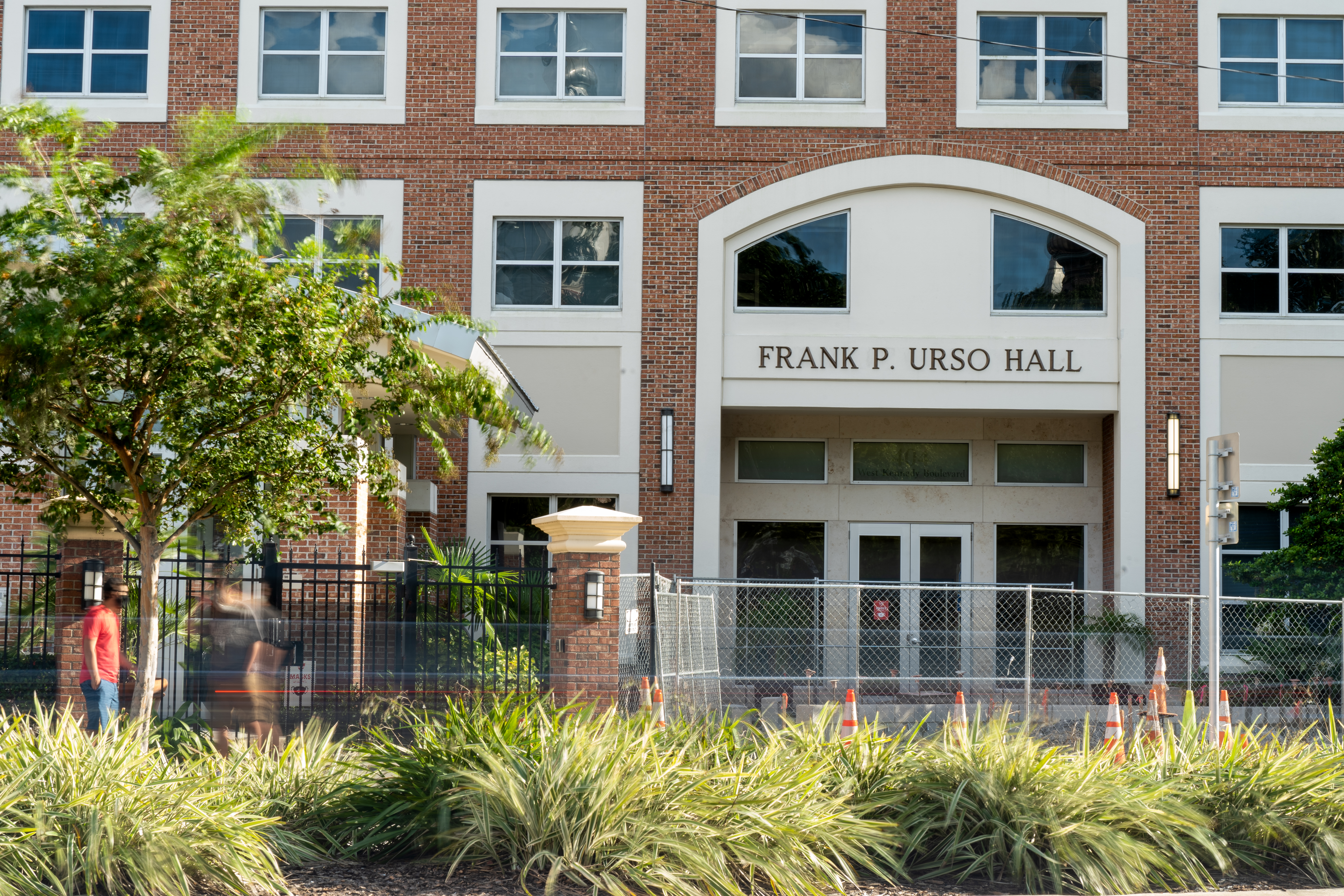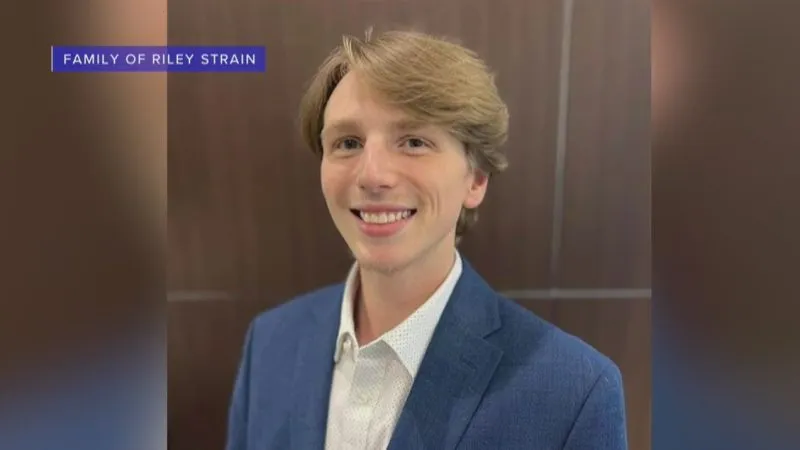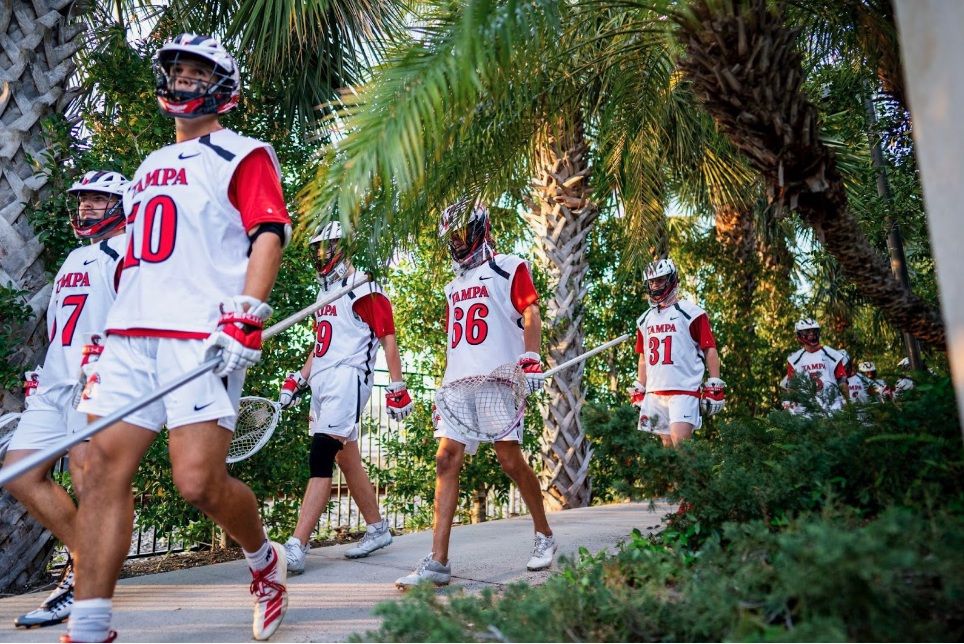By Mallory Culhane & Preston Wimbish
Residential students at The University of Tampa who test positive for COVID-19, either on-campus at the Dickey Health and Wellness Center or somewhere off-campus, are provided an isolation space by UT to quarantine in the Barrymore Hotel or Urso Hall.
This procedure is part of UT’s Spartan Shield Health Safety Plan to combat COVID-19 on-campus. However, some students who have had to quarantine on-campus have experienced several issues while in isolation.
“They kind of checked up on us, I kind of thought that they would be a little bit more worried about us than they were,” said Brooke Bagil, freshman psychology major, who quarantined in Urso Hall from Thursday, Sept. 3 to Tuesday, Sept. 8.
When students first enter quarantine, a bag of “essentials” is in their rooms consisting of water bottles, various snack foods and frozen meals, linens, extra masks and gloves, and toiletries, according to Jennifer Scaia, associate dean of Student Conduct, Orientation and Residence Life. Students are also given a list of contacts in case they need anything, including numbers for Residence Life, Campus Safety, Dining Services, and Rapid Trace, UT’s contact tracing team.
When students head into quarantine, they communicate with Residence Life about their diet restrictions, which then get passed on to Dining Services to fulfill students’ meal deliveries. Students are supposed to get meals delivered to their door every day between 11 a.m. to 12 p.m. and 6 p.m. to 7 p.m..
Some students in quarantine, however, have experienced a lack of food or supplies during their stay in isolation.
Cady Nessralla, sophomore political science major, went into quarantine at the Barrymore Hotel while waiting for her COVID-19 test results to come back from the Health and Wellness Center. Nessralla said she wasn’t delivered food or water for two days upon her arrival in Barrymore, and only had the initial “essentials” bag with two water bottles, a few bags of cookies, pretzels, granola bars, and a frozen dinner.
“I ordered Uber Eats and I got like two water bottles but not everyone has the ability to go ahead and do that,” Nessaralla said. When she was able to order her food she was surrounded with other students who weren’t always social distancing. “Kids were coming down in pairs, threes – there were literally like 20 of us waiting for food. People were standing in groups talking to each other, so definitely people weren’t social distancing.”
Nessralla had contacted Dining Services asking to get food delivered during those first two days and was told that someone would drop food off in the evening, but they never did. Nessralla was told by Dining Services that her delayed food delivery may be due to her having to move from the room she was initially quarantined in. Her first room had a moldy refrigerator so she was moved to another room after contacting Barrymore’s front desk.
Still, some students have had difficulties connecting with staff members at UT in cases where they need something.
“I didn’t have a chance to think about what I was actually going to need, like I didn’t grab any medicine, my inhaler or anything,” said an anonymous UT freshman biology major, who was given 30 minutes to get from the on-campus wellness center where the student was tested on Friday, Aug. 28 to their designated quarantine room in Urso. “I had called Residence Life, contact tracers, and Campus Safety asking if someone could go into my room and get my Advil, my inhaler and bring it to the dorm but since it was a weekend nobody answered the phone.”
The student continued to contact Rapid Trace since they were consistently in contact with them during their time in isolation and monitoring their symptoms.
“He just told us to call 911, and I was like well that seems a little far fetched; like I’m not going to call an ambulance when I don’t need one,” said the student. “So we just had one of our upperclassmen who also tested positive take us to the hospital because nobody was in contact with us and nobody was going to get our medicine.”
Bagil experienced the same issue and had to Instacart order medicine and have it delivered to Urso.
Students are also given designated outside time from 3 p.m. to 4:30 p.m. every day to get fresh air, get food delivered, or to just get out of their rooms for a while. Students in Urso are able to go outside to the Urso courtyard or Plant Park across the street while maintaining physical distancing and wearing a mask.
“We did a lot of research over the summer…we talked to the Florida Department of Health and [asked]: does it make sense to offer some outdoor time and can we do that safely,” said Scaia. “And they recommended a way to do that safely, so that’s why we have that window of time.”
Students quarantined in the Barrymore are able to step outside and be in the front of the building. Some students, however, note that because there are no Resident Assistants (RAs) or other UT personnel to monitor students, they could leave their room at any time, potentially putting the rest of the community at risk, particularly because Nessralla noticed many guests aren’t always wearing masks.
“They should have someone posted here like we are staying in a hotel, we are being exposed to the public every time we go in the elevator or go downstairs,” said Nessralla. “Like yes we’re separated by floors but these people are all still using the same elevator as us, everyone goes down to get food at some point.”
Bagil expressed the same concern at Urso.
“Nobody was really checking up on me, if I walked outside honestly no one would know if I was a regular student or COVID student,” said Bagil. “I didn’t want to leave my room anyway but there wasn’t too much watch over us.”
As stated in the Spartan Shield Health Safety Plan, much of UT’s precautions this year to mitigate the spread of COVID-19 revolve around students doing their part by following UT’s policies and adhering to social distancing and mask-wearing.
“Students have a lot of information about what it means to be in isolation, so being college students I think that they would think about their own health, the health of their community and be able to help us regulate that,” said Scaia. “It’s a community effort here…I always like to give students the benefit of the doubt so that’s what we tried to do.”
Still, cases at UT have been rising: 87 new cases were reported in the week of Friday, Sept. 11, and 105 new cases were reported the following week on Friday, Sept. 18. UT’s website also shows that of the 216 students who have tested positive for COVID since the start of the semester, 98 students have recovered by Friday, Sept. 18.
UT received an additional 300 rapid tests last week and has performed 136 rapid tests as of Monday, Sept. 21 according to Gina Firth, associate dean of wellness. The university does not have plans to test all students.
Many students are skeptical of staying in person through the end of the Fall semester. Nessralla says that initially, before quarantining, she had faith that the semester could finish as is.
“After seeing how [quarantine] is being handled here, I feel like it’s inevitably going to end up going online if this is how things keep continuing,” said Nessralla.




